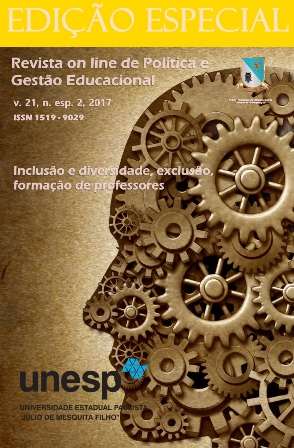Avaliação da aprendizagem e inclusão escolar: um processo de exclusão ou um ato de amor
DOI:
https://doi.org/10.22633/rpge.v21.n.esp2.2017.10174Palavras-chave:
Avaliação de aprendizagem. Necessidades educacionais especiais. Inclusão escolar.Resumo
Muito se tem escrito e falado sobre a inclusão escolar de alunos com necessidades educacionais especiais na rede regular de ensino. Entretanto, apenas a matrícula em si não é suficiente para incluir se não há condições efetivas de aprendizagem e avaliação, de forma que as diferenças sejam respeitadas e trabalhadas. O presente trabalho tem como objetivo estudar e analisar as diversas formas de avaliação do ponto de vista teórico e como elas podem contribuir com o sucesso da inclusão escolar. Apresentaremos o percurso histórico sobre os tipos de avaliação, uma breve reflexão sobre a inclusão e o papel do professor nesse processo e apontaremos o papel da avaliação na efetivação da inclusão escolar. Partindo dos princípios de que a educação é a base para o desenvolvimento do cidadão, e de que a inclusão escolar é um direito, e amparando-se nos pressupostos da concepção histórico-crítica, destacamos a contribuição da avaliação nesse processo. Contudo, se as necessidades dos discentes não são atendidas e a avaliação aponta as limitações e não as possibilidades, o processo de inclusão não poderá, de fato, se efetivar. As discussões aqui expostas apontam que, gradativa e interativamente, a inclusão está se efetivando, embora haja, ainda, um longo caminho a percorrer.Downloads
Referências
BRASIL. Constituição da República Federativa do Brasil. Brasília: Supremo Tribunal Federal, Secretaria de Documentação, 2017. 514 p.
BRASIL. Ministério da Educação, Secretaria de Educação Especial. Projeto Escola Viva: Garantindo o acesso e permanência de todos os alunos na escola – Alunos com necessidades educacionais especiais. Brasília: MEC/SEESP, 2005, vol. 5. 20 p.
BRIANT, Maria Emília Pires.; OLIVER, Fátima Corrêa. Inclusão de crianças com deficiência na escola regular numa região do município de São Paulo: conhecendo estratégias e ações. Revista Brasileira de Educação Especial, Marília, v. 18, n. 1, p. 141-154, jan./mar. 2012.
CARNEIRO, Moaci Alves. LDB fácil: leitura crítico-compreensiva, artigo a artigo. Petropólis, RJ: Vozes, 2015. 845 p.
COMENIUS, Iohannis Amos. Didactica Magna. Versão para eBook: eBooksBrasil.com. In. Como examinar as lições ditadas e escritas. Disponível em: https://social.stoa.usp.br/articles/0016/1300/Didatica_Magna__COMENIUS.pdf. Acesso em: 01 jul. 2017.
COMENIUS, Iohannis Amos. Didactica Magna. Versão para eBook: eBooksBrasil.com. In: Como se estimular para os estudos. Disponível em: https://social.stoa.usp.br/articles/0016/1300/Didatica_Magna__COMENIUS.pdf. Acesso em: 01 jul. 2017.
DECLARAÇÃO DE SALAMANCA. Sobre princípios, políticas e práticas na área das necessidades educativas especiais. Espanha, 1994. 17 p.
LUCKESI, Cipriano Carlos. Avaliação da aprendizagem escolar: estudos e proposições. São Paulo: Cortez, 2011. 272 p.
MORIN, Edgar. Educação e complexidade: os sete saberes e outros ensaios. São Paulo: Cortez, 2013. 109 p.
PERRENOUD, Philippe. Avaliação: da excelência à regulação das aprendizagens: entre duas lógicas. Porto Alegre: Artes médicas, 1999. 183 p.












